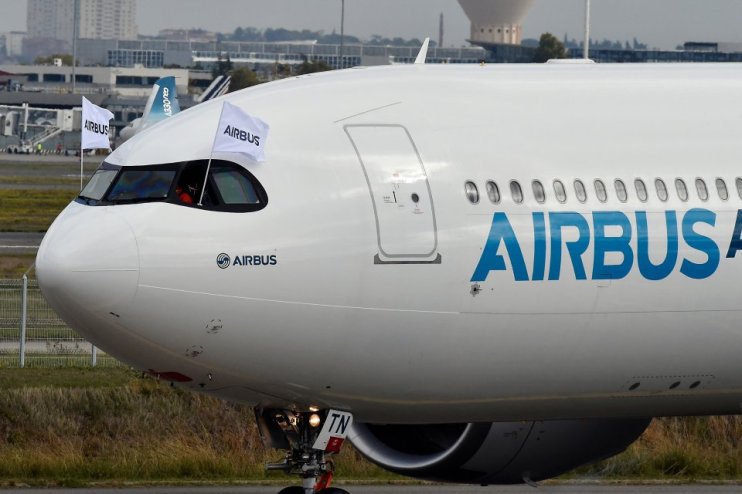Airbus agrees to pay record €991m UK fine in €3.6bn global bribery settlement

A London court today approved a record €991m (£833m) fine for Airbus in exchange for suspending the prosecution of alleged bribery.
The deferred prosecution agreement (DPA) was part of a €3.6bn global deal agreed with prosecutors in the UK, US and France.
Airbus has agreed to pay France €2.08bn and the US €525m to bring to a close a four-year probe into bribery at the European aerospace giant.
In her judgment, Dame Victoria Sharp, President of the Queen’s Bench Division, said: “The seriousness of the criminality in this case hardly needs to be spelled out. As is acknowledged on all sides, it was grave.”
Sharp said the investigation found that bribery was “endemic in two core business areas within Airbus”.
Get the news as it happens by following City A.M. on Twitter.
Allison Clare, a barrister for the UK’s Serious Fraud Office (SFO), told a crowded courtroom at the Royal Courts of Justice that Airbus had been accused of five counts of failure to prevent bribery, which were now suspended for three years.
Clare said the UK settlement “exceeds the combined sum of all previous UK DPAs”.
Airbus was ordered to pay a €983m fine and costs to the SFO of €8m. The fine consisted of a disgorgement of profits of €585m and a financial penalty of €398m.
The allegations related to an Airbus department which worked with overseas agents which it paid for successful aircraft sales.
Counts one–to-four of the indictment for failure to prevent bribery under section seven of the Bribery Act 2010 related to its commercial aircraft division.
The fifth count, for the same offence, related to its military aircraft division.
The first count related to aircraft sales to Malaysia-based Air Asia, the second count to sales to state-owned Sri Lankan Airlines, the third to Taiwanese airline Trans Asia Airways and the fourth to Indonesian flag carrier Garuda and its low-cost brand Citilink.
The fifth count concerned the sale of military transport planes to the government of Ghana.
The SFO said investigation into individuals remains ongoing.
Lisa Osofsky, director of the SFO, said: “Airbus paid bribes through agents around the world to stack the decks in its favour and win contracts around the globe. Corruption like this undermines free trade and fair development and it is to Airbus’s credit that it has admitted its culpability, cleaned its house and come forward to put this conduct to bed.”
Clare said that one of the reasons that charges had been suspended was the “exemplary, genuine and proactive cooperation by Airbus” with prosecutors.
She said Airbus had taken “substantial remedial measures” and was now a “different company to that which it was at the time” of the offences.
A barrister for Airbus noted the “changes in the culture and management of the company” and said a DPA would “draw a clear line under the investigation”.
In May City A.M. reported that the mammoth probe could settle by as soon as the end of 2019.
The SFO opened an investigation into suspected bribery at Airbus in July 2016 with French authorities joining the joint investigation in 2017.
The Anglo-French probe ran in parallel to investigations by the US Department of Justice and the US Department of State.
The huge investigation dealt with “in excess of 30m documents,” Rose said.
DPA’s are US-style plea-deals which were introduced in 2014 and allow prosecution of a company to be suspended in exchange for a company agreeing to certain terms, such as paying a fine and agreeing to cooperate with the prosecution of individuals.
While the investigation of individuals is ongoing, the SFO has failed to successfully prosecute individuals following past DPAs.
Ross Dixon, partner at Hickman & Rose, said: “The jury is still out as to whether DPAs are fair to the individuals who are blamed in these deals.
“Not a single person has been convicted in any of the five DPAs to have so far completed the criminal justice process, giving rise to serious concern that individuals are unfairly blamed and thrown under the bus by a company keen to avoid prosecution itself.”
Last year the SFO dropped its investigation into individual executives at Rolls Royce after it agreed a £497m DPA with the engine-maker.
Prosecutions of three senior ex-Tesco executives collapsed in 2018 and 2019 because of insufficient evidence following the supermarket’s DPA with the SFO in 2014.
The successful conclusion of the investigation into Airbus is a coup for its director Lisa Osofsky who was criticised this year after dropping a major investigation into Glaxosmithkline and failing to pursue individuals in connection to Rolls Royce.
Barry Vitou, London head of white collar crime at law firm Greenberg Traurig, said: “It’s significant because it’s a three-way investigation by regulators in three countries and importantly a co-ordinated resolution.
“I think it’s a feather in the cap for each of the three countries.”
Aziz Rahman, senior Partner at business crime solicitors Rahman Ravelli, said: “This one can be seen as a quick, big win for the SFO which, under director Lisa Osofsky, is looking to close investigations as quickly as possible.”
DPAs are not universally loved, with some arguing they allow corporations to evade proper accountability for wrongdoing.
Daniel Bruce, chief executive of Transparency International UK, said: “We must ensure deferred prosecution agreements are not seen as an ‘easy way out’ for companies that can afford to pay.”
Rahman added: “Nobody from any of the seven companies granted DPA’s has been successfully prosecuted. There seems to be a problem in the UK when it comes to successfully prosecuting individuals for corporate crime.”